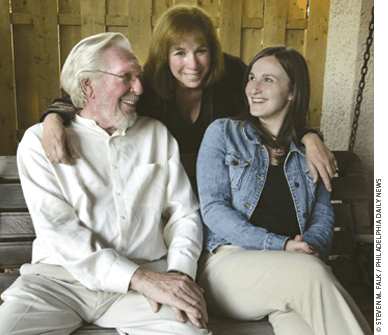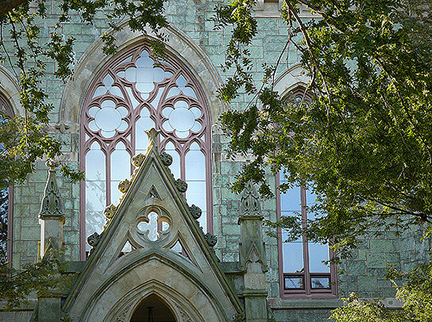
Dr. Morton Botel Ed’46 GEd’48 Gr’53 decided to become a teacher when he was an eighth-grader back at Samuel Tilden Junior High School in Southwest Philadelphia. The year was 1936, and Miss McGillicuddy (not her real name), like most of her contemporaries, was a staunch believer in the drill-and-kill method of rote memorization. During one particularly dull afternoon of classroom clock-watching, 13-year-old Mort suddenly thought, I can do this better than she can.
Thus began the life work of the Graduate School of Education’s visionary emeritus professor, whose career has spanned six decades and transformed the way reading is taught in America. Botel started his association with Penn as a freshman in 1942 and continued until he retired in 2004. Having long been at the forefront of what is now known as the literacy movement, this gentle soul with the snowy white beard helped spawn a generation of teachers with dynamic and flexible classroom techniques unimaginable to old Miss McGillicuddy.
And that’s not all Mort Botel has spawned. The May 2006 graduation of his grand-daughter, Lara Botel-Sheppard GEd’06, from the GSE launches the third generation of what is turning into a veritable Botel dynasty. For the past 11 years, Mort’s daughter (Lara’s mother), Dr. Bonnie Botel-Sheppard CGS’74 GEd’76 GrEd’81 GEd’99, has served as director of the Penn Literacy Network (PLN), which was founded by her father in 1982.
Mort didn’t start out to become a crusader. He was a scholarship kid from Bartram High School in 1942 and hoped to give back to his community by becoming a high-school history teacher. After graduation and a brief stint at Harvard, where he studied naval air communications—World War II ended the day before he was called up to serve—Botel earned a master’s degree from Penn’s evening program while he substitute-taught math in Philadelphia high schools. But his first full-time job, at the Mt. Pleasant School District in Delaware, was a rude awakening: The high-school students in his classes couldn’t learn the history he was teaching them because they couldn’t read their textbooks.
Botel realized that, despite his undergraduate and master’s degrees in education, he simply didn’t know enough to be a teacher. He went back to Penn, this time for a Ph.D, changing his focus to reading.
“In those days,” he says, “reading was viewed as a subject to be taught. I started to understand that reading is not an end in itself, but a process. Every teacher is both a teacher of content and a teacher of reading.” His mission would be to reach as many children as possible by teaching their teachers.
By now married and with a young family to support, Botel completed his doctorate in a blistering two years, and in 1955 landed his first big position, as the supervisor of reading and English in the Bucks County, Pennsylvania school system. There he instituted a five-year plan titled “Reading and Writing Across the Curriculum.” What sounds to the ears of modern parents like a familiar and sensible approach to education was then revolutionary. But Charles Baim, the forward-thinking district superintendent, stood behind Botel, and the program blossomed. Throughout the next 50 years of his career, Botel authored research-based frameworks for the state of Pennsylvania (and beyond) that have become models for education reform.
All the while, he stayed connected with Penn, teaching one or more courses every semester until, in 1966, he was invited to overhaul the GSE’s program in remedial reading, which was soon renamed the Reading and Language Arts program. Later, he established the Penn Literacy Network, which offers long-term professional development and continuing-education seminars to teachers in a variety of subjects at every grade level, on-site in their own school districts.
The PLN is now run by Bonnie Botel-Sheppard, a springy blond whirlwind of energy. If Mort is the visionary and planner of the family, Bonnie is the doer: arranging seminars, juggling calls and e-mail, and directing her hand-picked staff of 60 as well as more than 1,000 teachers in the 45 school districts PLN currently serves in Pennsylvania, New Jersey, and Delaware.
An activist by inclination, Bonnie enjoyed reading primarily as a means of gathering information and communicating. During high school she became heavily involved with student government and her synagogue, and went off to the University of Pittsburgh with plans to enter rabbinical school after graduation. But after a bad case of mono during her freshman year sent her home, she transferred to CGS for what was to be a semester’s convalescence. Commuting from Bucks County to West Philadelphia by car with her dad at the helm opened up a lifelong dialogue between Bonnie and Mort, whose enthusiasm for his research infected his daughter. The semester at Penn turned into a B.A. in Jewish studies and, eventually, two master’s degrees and a Ph.D. in education.
Bonnie has never left Penn, except for a brief spell when she moved, as a newlywed, to her husband’s home territory in western Pennsylvania, after completing her first GSE master’s degree. “I was homesick, and being away made me realize how much I missed Philadelphia and Penn,” says Botel-Sheppard, who now lives with her husband, Bob Sheppard, and their younger daughter, Anna, a seventh-grader, just a block from Mort’s home in the East Falls section of the city. She and her dad continue their conversations about education and pedagogical theory during regular walks along the banks of the Wissahickon Creek.
Mort Botel founded PLN in 1981 when Bonnie was pregnant with her older daughter, Lara. Eventually, he began parceling out PLN facilitator assignments to Bonnie, who was already busy with her own teaching, working on her Ph.D., and raising her three children.
“Dad understood what he was doing. He threw me right into the water before I knew that I could swim,” says Bonnie. “He’d say, ‘Oh, here’s a small assignment [facilitating a teacher’s seminar] in New Jersey.’ Then I’d arrive and there would be 140 people speaking two different languages. And the other language was Greek! I’d have to wing it. But that seminar turned out great, and so did the next one, and the next one. That’s how I learned self-reliance, by rising to the occasion. It was a real eureka experience for me, which I’ve used with my own students.” In 1992, at the GSE dean’s suggestion, Mort left PLN to focus on other projects, and Bonnie took the helm.
Lara Botel-Sheppard, born the same year as the Penn Literary Network, admits to growing up the family bookworm, with a strong taste for fiction. She also inherited her mother’s penchant for political activism. As a teenager, Lara taught Hebrew school, and went off to college at Franklin & Marshall in Lancaster, Pennsylvania, with a specific career goal in mind: to become an immigration and political-asylum lawyer. But during a semester’s hiatus from college, she did some volunteer tutoring at a local public elementary school and discovered her passion for teaching.
During her year at George Washington High School in Northeast Philadelphia, Lara discovered that her students couldn’t read their textbooks. It was the same epiphany her grandfather had experienced back in Mt. Pleasant, Delaware, in the late 1940s. She set to work introducing time-tested literacy techniques to increase her students’ level of involvement and comprehension. Her class was a success. Student interest soared.
“And so,” says Mort, “we come full-circle.”
Lara, who took the last Penn seminar Mort taught before he retired, enters the profession with an arsenal of practical, research-based techniques developed by her grandfather and his colleagues over the past half-century. “She knows everything I know,” says Mort, with a smidgeon of hyperbole, “at the beginning of her career.”
—Karen Rile C’80



